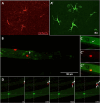Positive effect of evobrutinib in CNS remyelination models and lack of synergy with clemastine-A dose response study
- PMID: 40125491
- PMCID: PMC11930471
- DOI: 10.1177/20552173251326913
Positive effect of evobrutinib in CNS remyelination models and lack of synergy with clemastine-A dose response study
Abstract
Background: To recover normal functions, remyelination in multiple sclerosis is crucial. Although endogenous remyelination occurs, it is often insufficient, and finding molecules promoting repair of demyelinated lesions is needed.
Objectives: To compare the remyelination potential of evobrutinib, an inhibitor of Bruton's tyrosine kinase and clemastine, an antagonist of M1 muscarinic acetylcholine receptor.
Methods: Remyelination was investigated in lysolecithin demyelinated organotypic mouse cerebellar slices and a transgenic Xenopus model of inducible-demyelination.
Results: Evobrutinib (100 nM) and clemastine (200 nM) potentiated remyelination of mouse cerebellar slices by a factor of 2.9 and 1.76, respectively. In conditionally demyelinated Xenopus, evobrutinib and clemastine increased remyelination by a factor of 1.61 and 1.92, respectively. Evobrutinib targets Bruton's tyrosine kinase expressed by microglia, and we showed that the increase in number of myeloid cells following demyelination is due to an extravasation from nearby vessels of macrophages migrating toward the optic nerve. In contrast, clemastine is expected to antagonize muscarinic receptor 1 expressing cells of the oligodendroglial lineage. We investigated a possible synergistic effect on remyelination by adding simultaneously both molecules. In both experimental models tested no significative improvement on remyelination of co-treatment with evobrutinib plus clemastine was observed.
Discussion: While evobrutinib increased 1.59 fold the number of microglia/macrophages, in the presence of clemastine the number of innate immune cells was decreased by 0.39 fold, therefore counteracting the beneficial effect of microglia/macrophages on remyelination.
Keywords: Myelin; demyelination; myelination; oligodendrocyte; remyelination.
© The Author(s), 2025.
Figures





References
-
- Kubo N, Shirakawa O, Kuno Tet al. et al. Antimuscarinic effects of antihistamines: quantitative evaluation by receptor-binding assay. Jpn J Pharmacol 1987; 43: 277–282, https://linkinghub.elsevier.com/retrieve/pii/S0021519819435087 (accessed 24 December 2023). - PubMed
-
- Zada D, Tovin A, Lerer-Goldshtein T, et al. Pharmacological and BBB-targeted genetic therapies for thyroid hormone-dependent hypomyelination. Dis Model Mech. Epub 2016 Jan 1:dmm.027227, https://journals.biologists.com/dmm/article/doi/10.1242/dmm.027227/25726... (accessed 1 January 2024). - DOI - PMC - PubMed
-
- Mannioui A, Vauzanges Q, Fini JB, et al. The Xenopus tadpole: an in vivo model to screen drugs favoring remyelination. Mult Scler 2018; 24: 1421–1432. - PubMed
LinkOut - more resources
Full Text Sources

